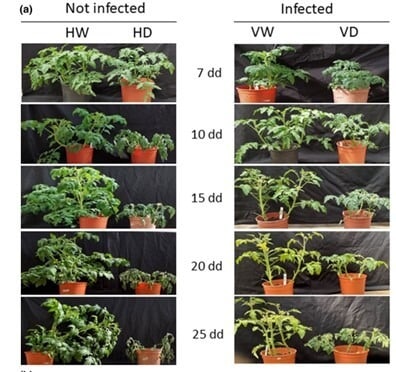Although we are mostly familiar with viruses that harm us, it turns out that some of them are actually good and beneficial, both for humans and plants. A virus discovered in Israel in the XNUMXs helps tomatoes grow in a harsher climate

Prof. Hanoch Zusnak from the Faculty of Agriculture at the Hebrew University, in collaboration with Prof. Rina Gurovitz and researchers from Al Balka University in Jordan, found that the TYLCV virus, which was discovered in Israel in the 90s, increases the resistance of tomatoes to drought during a drought and produces fruit, while plants that were not infected with the virus wilted. All this without harming the quality of the fruit.
Global warming has led to extreme changes in the weather and severe water shortages in many places. This requires finding unconventional solutions to ensure a regular supply of food for humans and livestock. A possible solution is to help those plants face the drought artificially. One of the ways to do this is to assist with artificial means. Although we are mostly familiar with viruses that harm us, it turns out that some of them are actually good and beneficial, both for humans and plants.
The TYLCV virus was discovered and isolated for the first time in the 90s by Prof. Zusnak and since then it has been used for various research purposes. In general, the virus, which is transmitted in nature by an insect called the tobacco moth aphid, causes a disease that leads to the halting of the development of the tomato plants, resulting in an almost complete loss of the crop. Since then, many researchers are trying to cultivate a strain of tomato that is resistant to the virus and despite the infection maintains a significant crop. Now, the researchers have discovered that the virus causes the activation of a general antiviral system in the infected plant, which can give plants that are resistant to the virus tolerance against heat and drought, compared to plants that have not been infected with it.
Pre-infection of tomato seedlings with a commercial strain of the virus causes them to produce substances such as proteins, sugars and amino acids that help the plant in the face of a lack of water. According to the researchers, the virus may also be effective on other edible plants, such as cucumber and pepper. Now the applied possibilities of the research are being tested in front of different commercial companies.
Prof. Rina Gorovitz and PhD student Moshe Steinberg from the Faculty of Agriculture at the Hebrew University and Prof. Gandi Anfoka from Al-Balka University in Jordan also participated in the study. The study was funded by the MERC Regional Cooperation Fund of the USAID.
More of the topic in Hayadan:
